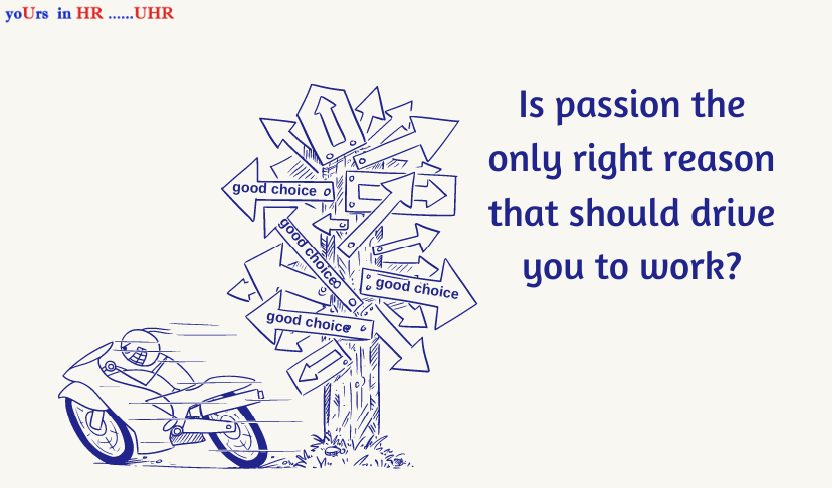
We all must have heard, and used phrases such as:
‘I love what I do.’
‘I love my job.’
‘My work is like worship to me.’
‘I am passionate about this field.’
Or maybe we are looking for something that enables us to use these phrases.
In any case, being passionate about one’s job, loving what one does is considered the ideal to reach.
It is the ultimate catchphrase for freshers, and a constant source of aspiration for any professional. Is
it though? And is it okay if being passionate about one’s job isn’t the primary source of motivation?
A study by Harvard Business Review found that some employees may feel alienated by colleagues
whose primary motivation is their passion for their jobs. Plus, the research also found that the
people passionate about their jobs may actually develop a judgmental and unhelpful attitude
towards those who they imagine do not have passion as their primary motivation.
Imagine a scenario: Mr. B and Mr. A are both passionate about their jobs. While having a little
chitchat with Mr. C, the former duo discovered that Mr. C is primarily working because he needs the
stability of a 9 to 5 corporate job, after having worked freelance for many years. Mr. B and Mr. A feel
like they cannot take Mr. C seriously, because they think passion should be the primary driving force
for doing one’s job, and nothing else. They eventually become cold, lose respect for Mr. C and do not
extend much help to him, because they don’t think he values the job as much as they do. They think
Mr. C is working for the ‘wrong reasons.’ Who seems to be in the wrong here, actually?
In psychological terms, the research shows that ‘intrinsic’ motivation is seen as the ideal and the
morally right thing to have, and anyone working for a perceived ‘external reward’ such as financial
stability is considered to be in a not so morally superior place. That they are working for the ‘wrong
reasons.’
Now that sounds judgmental, doesn’t it?
The bottom line here for managers and employees in this is a simple, obvious and yet a poignant
truth: some people may have motivations that are more external and less intrinsic.
Some people might be working at a job because it offers them financial stability.
Some people might be working at a job because they have some family obligations to fulfil
and this is the best possible course of action for them.
Some people might be working at a job because they want the flexibility and free time the
job offers.
Some people might be working at a job because they are still exploring what genuinely
drives them and they are still learning about themselves.
And so on. In other words, some people might be working at a job because that is the best
alternative for them at the moment. And they are just fine with it, even thriving in it. And it may
or may not be the job that they are passionate about.
It is okay to be working at a job when your primary motivation isn’t passion for the job. Of course, a
certain skill-level, interest and competence are necessary, and there’s no denying that passion and
drive can increase those aspects manifold. But so can the other external motivations in their own
way.
Now some might ask- wouldn’t it help an organisation better if everyone was passionate about their
work, rather than only some employees doing the work in a more driven manner?
Firstly, one can be great at their job, and still not have passion as their driving force. That doesn’t
mean that passion is entirely absent. The primary motivation could be say, financial stability and
the structure that job offers, which can still enable one to give their best.
Secondly, diversity in thought, motivations, perspectives and values is necessary. Employees with
varying driving forces, with variety in life experiences and calling make an organisation complete.
Such a diversity is needed for the organisation to run smoothly, as different times, different projects,
different situations call for these different and diverse ways to handle them.
It is this diversity where everyone learns from each other, and complements each other. When
employees are accepted for who they are, without being judgmental about their choices, it is then
that they can truly develop a healthy level of motivation for their job.